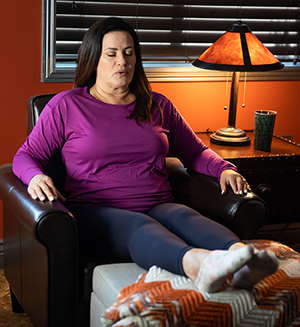Relax between activities
Take time between activities to relax. Deep breathing is a good way to relax. Try the following:
-
Sit in a comfortable chair with both feet on a footrest.
-
Close your eyes.
-
Breathe in slowly and deeply through your nose to the count of 2.
-
Pucker your lips, as if you were going to blow out a candle. Then breathe out slowly through your mouth to the count of 4.
-
Breathe normally a few times.
Repeat until you feel relaxed.
Get plenty of rest
Getting plenty of rest will help you get your strength back faster.
-
Try to get a good night's sleep. It helps to go to bed at the same time each night. Don't stay up late 1 night and try to catch up the next.
-
Don't get anxious if you can't sleep through an entire night. Just relax. Your sleeping patterns will become more normal with time and as your recovery continues.
-
Stop and rest for a few minutes after each activity and whenever you feel tired. You can just relax for a time. Try not to nap, because that can affect your nighttime sleep.
When to slow down
Slow down if you feel any of the following symptoms. They are signs that you are doing too much too soon.
-
A dull ache, tightness, or increased pain in your chest, shoulders, or arms
-
Pounding or fluttering in your chest
-
Trouble breathing
-
Feeling very tired, faint, or dizzy
Call 911 if any of these symptoms get worse or don't go away after 20 minutes with rest. Even if they do go away, let your health care provider know about them right away.
Featured in



